Johnny
Cash

-
Inducted1980
-
Born
February 26, 1932
-
Died
September 12, 2003
-
Birthplace
Kingsland, Arkansas
Johnny Cash was an international ambassador for country music who hewed his own path from the mid-1950s into the twenty-first century, broadening both the scope of country music and its audience.
The Man in Black’s Early Years
John R. Cash grew up in a government resettlement colony for struggling farmers in Dyess, Arkansas, working the cotton fields with his family and absorbing gospel music in church. On a battery-operated radio, he heard local country shows from Memphis, the Carter Family on border radio, and a host of Grand Ole Opry singers.
Cash gained performing experience in high school assemblies and on KLCN in Blytheville, Arkansas. After working briefly in Pontiac, Michigan, he joined the U.S. Air Force and served in Germany for four years, during which time he wrote the future Sun Records classics “Folsom Prison Blues” and “Hey Porter.”
In 1954, his military stint over, Cash settled in Memphis, married Vivian Liberto, and became an appliance salesman. Seeking a music career, he teamed with mechanics Luther Perkins (electric guitar) and Marshall Grant (upright bass) to perform gospel songs in church and on local radio.
Songs
00:00 / 00:00
00:00 / 00:00
00:00 / 00:00
Career Start at Sun Records
In the wake of Elvis Presley’s 1954 breakthrough at Sun Records in Memphis, Cash and his minimalist band auditioned for its owner-producer, Sam Phillips. Beginning with the double-sided hit “Cry! Cry! Cry!”/“Hey Porter” in 1955, Cash became one of the label’s most promising young artists.
Country hits “I Walk the Line,” “Ballad of a Teenage Queen,” and “Guess Things Happen That Way” crossed over to the pop charts and made Cash a dominant new country singer in the late 1950s. The style Cash set early on changed little over the years; the addition of drummer W. S. “Fluke” Holland in 1960 merely reinforced his trademark rhythm-based sound.
The Columbia Years
Cash left Sun and signed with Columbia Records in mid-1958. Hit singles such as “Don’t Take Your Guns to Town” (1959) and “Ring of Fire” (1963) followed, but Cash increasingly turned his attention to recording concept albums such as Ride This Train (1960), Blood, Sweat and Tears (1962), Bitter Tears: Ballads of the American Indian (1964), and Ballads of the True West (1965). Producer Don Law encouraged Cash to connect with the burgeoning folk music revival of the times. He explored cowboy songs, gospel and traditional spirituals, songs of social conscience and protest, and adaptations of folk material, though his new directions did not always find favor with country’s old guard.
In the mid-1960s, Cash suffered from addiction to pills while his first marriage failed, but with the help of June Carter, a member of the Carter Sisters with whom he recorded several hit duets, Cash was able to overcome his addiction. Cash and Carter married on March 1, 1968.
On January 13, 1968, Cash recorded his masterful live album At Folsom Prison, from which came a new, #1 version of “Folsom Prison Blues.” The album and his 1969 live album At San Quentin pushed Cash’s career to new heights. Taken from the San Quentin album, “A Boy Named Sue” (#1 country, #2 pop) became Cash’s biggest-selling single and a Country Music Association Single of the Year (1969). Cash was also voted the CMA Entertainer of the Year in 1969.
From 1969 through 1971, Cash hosted The Johnny Cash Show, a prime-time network television variety show that showcased his status as a national icon while featuring an eclectic mix of guest performers. A live cut from the show, “Sunday Morning Coming Down”—written by Kris Kristofferson—became a #1 country hit for Cash, and he increasingly recorded and featured on the show the work of new songwriters drawn to country from folk and rock music backgrounds.
From the late 1960s, and into the 1970s and 1980s, Cash toured with his powerful road troupe, which included at various times Mother Maybelle Carter, the Carter Sisters (Helen, June, and Anita), Carl Perkins, and the Statler Brothers. He also broadened the range of his pursuits to include acting, including the feature film A Gunfight (1971) with Kirk Douglas, the made-for-TV movies Thaddeus Rose and Eddie (1978, with June Carter) and The Pride of Jesse Hallam (1981), and a guest-star appearance in an episode of Columbo.
As the 1970s progressed, Cash’s hit records grew more infrequent. But with his old friends Waylon Jennings, Willie Nelson, and Kris Kristofferson, Cash earned a #1 hit with the title cut of the Highwayman album in 1985. The foursome did a series of special limited concert tours and recorded two more albums: Highwayman 2 (1990), and Highwayman: The Road Goes on Forever (1995).
Videos
“Hurt” music video
2002
“Ring of Fire”
Austin City Limits, 1987
The style Johnny Cash set early on changed little over the years; the addition of drummer W. S. “Fluke” Holland in 1960 merely reinforced his trademark rhythm-based sound.
Photos
-
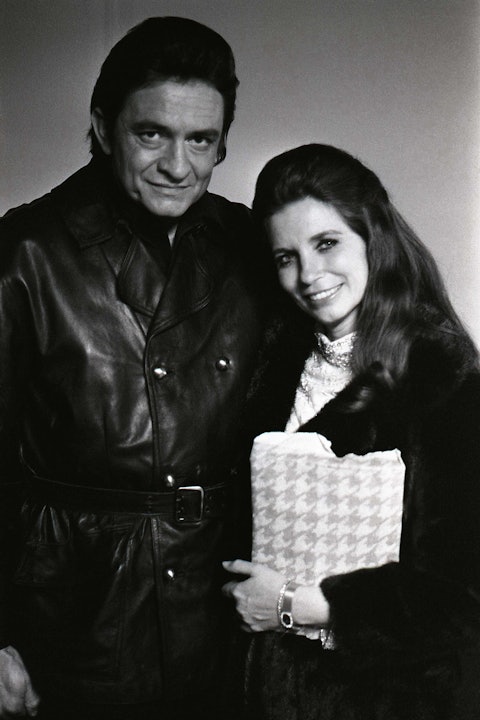
Johnny Cash and wife June Carter Cash backstage at The Johnny Cash Show, 1970. Photo by Raeanne Rubenstein.
-
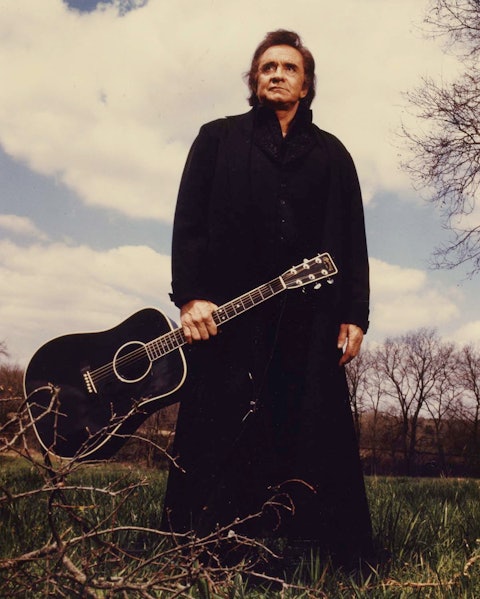
Johnny Cash, 1994. Photo by Walden S. Fabry Studios.
-
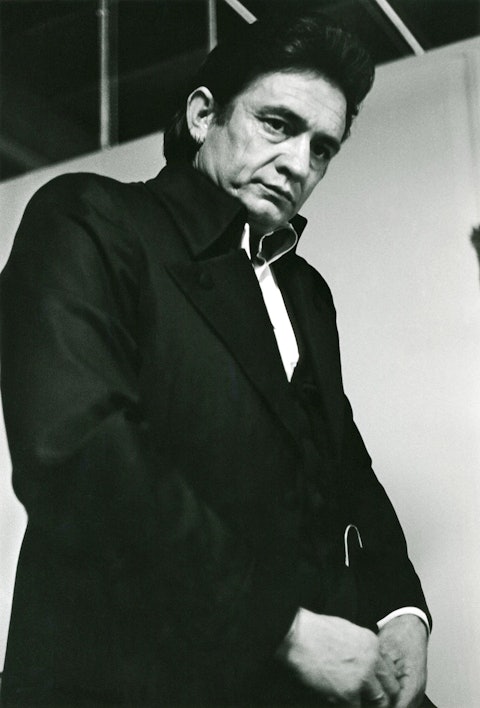
Johnny Cash backstage at The Johnny Cash Show, 1970. Photo by Raeanne Rubenstein.
-
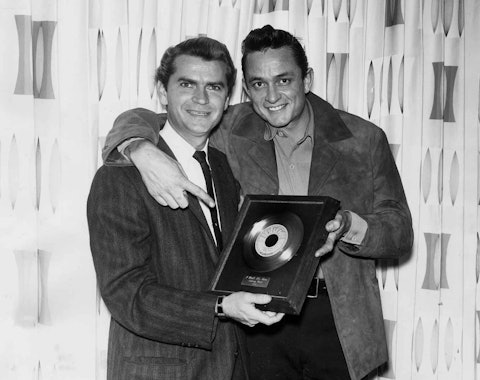
Johnny Cash is presented by a gold record for his song “I Walk the Line” by producer Sam Phillips, late 1950s.
-
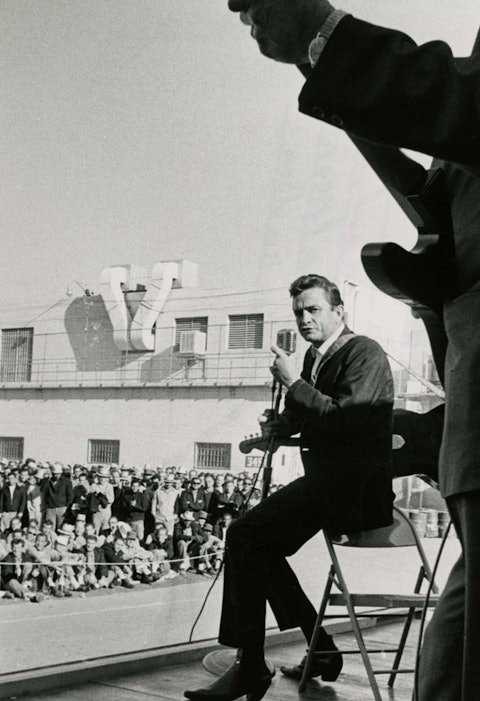
Johnny Cash performs at Folsom Prison, 1968.
-
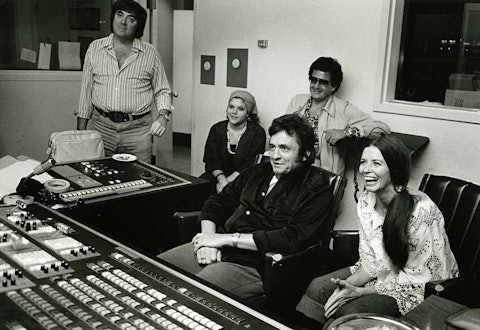
Johnny Cash and wife June Carter Cash sit at the mixing board in an unidentified studio, 1973. Johnny’s daughter Rosanne Cash, at the time a teenager, sits behind them, between two unidentified men.
-
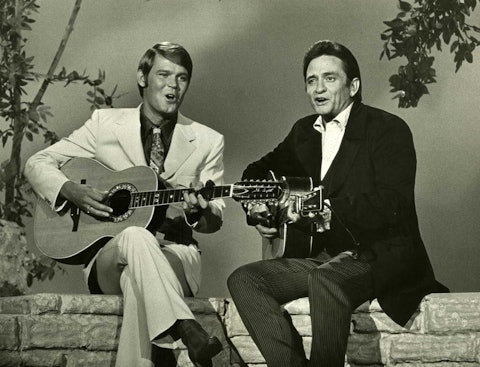
Johnny Cash and Glen Campbell perform on The Johnny Cash Show, 1969.
-
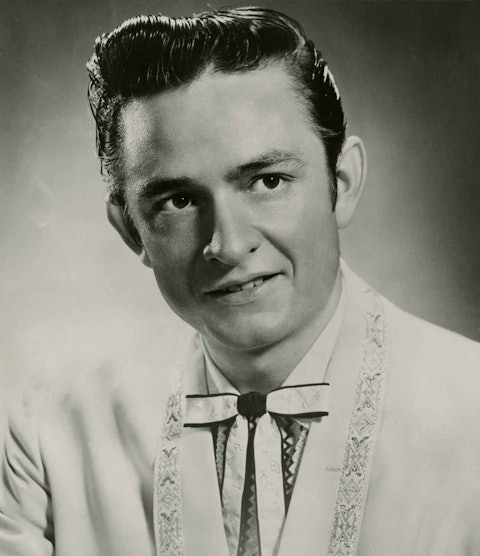
Johnny Cash, mid-1950s.
-
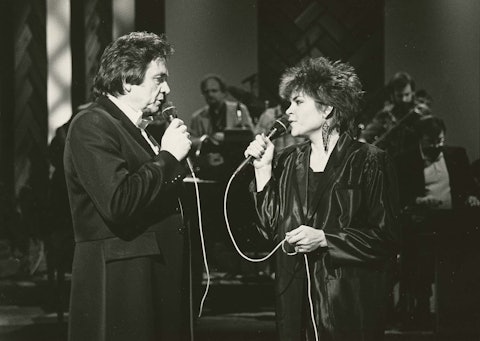
Johnny Cash and daughter Rosanne Cash, 1984.
-
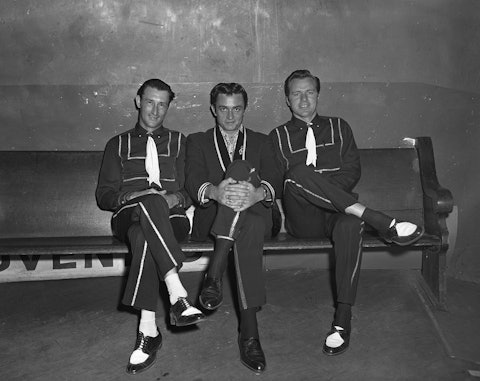
Johnny Cash and the Tennessee Two (Luther Perkins, left; Marshall Grant, right) backstage at the Grand Ole Opry, 1956. Photo by Elmer Williams.
A Resurgence with Rick Rubin
After Cash left Columbia in 1986, he recorded for Mercury until 1992 with minimal commercial success. But signed subsequently to the American Recordings label and working with producer Rick Rubin, he released American Recordings (1994), a widely acclaimed album consisting of Cash’s voice accompanied only by an acoustic guitar. The thirteen songs—some his own, some adaptations of folk pieces, and some from songwriters such as Tom Waits, Nick Lowe, and Loudon Wainwright—are often searing explorations of loss and sorrow.
For American Recordings, Cash received the Grammy for Best Contemporary Folk Recording. His 1996 American album Unchained featured a similarly eclectic mix of material, but with Cash backed by Tom Petty & the Heartbreakers, Marty Stuart, and other guest performers. It was awarded a Grammy for Best Country Album.
Health problems forced Cash to stop touring in the late nineties, though he made occasional public appearances and continued to record with Rubin. Tracks from American III: Solitary Man (2000) and American IV: The Man Comes Around (2002) earned Grammys for Best Male Country Vocal Performance. In 2001, Cash received the National Medal of Arts, the country’s highest award for artistic excellence. His stark video for “Hurt,” a song by Nine Inch Nails’ Trent Reznor, won the admiration of a new generation of music fans, earning six nominations for the 2003 MTV Video Music Awards and winning one (Best Cinematography).
Cash died in 2003. Two years later, his life became the subject of a biographical film, Walk the Line, starring Joaquin Phoenix as Cash and Reese Witherspoon as June Carter. Phoenix and Witherspoon both won Academy Awards for their performances. American V: A Hundred Highways (2006) and American VI: Ain’t No Grave (2010), as well as 2014’s Out Among the Stars, featuring recordings made in the 1980s with Billy Sherrill, further strengthened Cash’s reputation as a cultural hero.
— Fred Danker
Adapted from the Country Music Hall of Fame® and Museum’s Encyclopedia of Country Music, published by Oxford University Press



